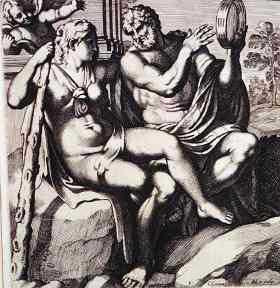Narrative poems
Long narrative poems on historical, political, even geographical topics, were written throughout the period. But the finest narrative poems were concerned, as Shakespeare's were, with love, often in a classical or mythological setting.
The precedent was Ovid*, translated by Arthur Golding in 1565, in a version we know Shakespeare read. As in so many ways, Marlowe led the way, this time with his Hero and Leander, left unfinished at his death. The poem, both erotic and witty, contains one of the most quoted lines in literature (1.167-70):
It lies not in our power to love or hate,
For will in us is overrul'd by fate.
Where both deliberate, the love is slight,
Who ever loved, that loved not at first sight?
Shakespeare's two major narrative poems, Venus and Adonis, and The Rape of Lucrece, are discussed in the section on his life. Click to go there, or click here to read about another important narrative poet, Michael Drayton.*
The illustration: art and mythology
Illustration of the myths of Greece and Rome was a major subject for many Renaissance artists, as in this example of the ill-fated love of Hercules and Deianeira*. Click to go to the section of this program on art and mythology in the Renaissance.
Footnotes
-
The maker of the Metamorphoses
Publius Ovidius Naso (43 BC-AD 17) was a prolific poet of great eloquence and wit. He was banished to the Black Sea in AD 8 where he lived the rest of his life among the Goths. His Metamorphoses was among Shakespeare's favourite works; it tells the tales of the many mortals and gods who, according to myth, were transformed in one way or another.
-
Michael Drayton
Though he does not excite the imagination as Marlowe and Shakespeare do, Drayton wrote poems that are especially valuable for those exploring the background of Shakespeare's England.
Most of his narrative poetry deals with historical topics, covering the same periods as the histories of Shakespeare and Marlowe. His most extensive work is the long poem Poly-Olbion, a discursive description of the landscape and history of England.
-
The tale of Hercules and Deianeira
The story is told by Ovid (9.155) and others. Hercules married Deianeira and had several children by her, at one time defending her from the centaur Nessus. Nessus gave her a shirt dipped in his own blood as he died, swearing that if Hercules wore it he would be faithful to her. Deianeira became jealous of Hercules' habit of taking mistresses and arranged that he wear the shirt for a sacrifice; as he did so it released poison, and he died with excruciating pain.
Antony, in Antony and Cleopatra, is compared to Hercules (from whom he was supposed to have descended); as he faces death he cries "The shirt of Nessus is upon me" (4.12.43).
